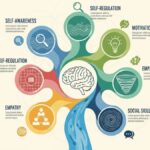For many years, academic success and emotional intelligence were viewed through a narrow lens, measured almost exclusively by grades and test scores. The primary focus in education remained squarely on cognitive abilities like mathematics, science, and literature. However, a deeper understanding of human development reveals that another set of skills is equally, if not more, crucial for a student’s holistic success. This vital skill set is known as emotional intelligence. It is the ability to understand, use, and manage your own emotions in positive ways to relieve stress, communicate effectively, empathize with others, overcome challenges, and defuse conflict.
Schools across the globe are increasingly recognizing that students need more than just traditional academic knowledge to navigate the complexities of life. Consequently, they are beginning to integrate programs designed to build and strengthen a student’s emotional intelligence. This significant shift acknowledges that personal well-being and academic achievement are deeply intertwined. When students can effectively manage their feelings, they are far better equipped to handle the pressures of school and the world beyond it. This makes developing emotional intelligence a top priority.
What is Emotional Intelligence?
At its core, emotional intelligence is about being smart with your feelings. It is a multifaceted concept that encompasses several key components that work together. First, there is self-awareness, which is the ability to recognize and understand your own emotions and their effect on your thoughts and behavior. Following that is self-regulation, the crucial skill of managing those emotions in a healthy and productive way.
Another critical element is motivation, which involves using your emotional drive to achieve goals with persistence and optimism, even in the face of setbacks. Empathy, the capacity to understand and share the feelings of others, is also fundamental to building strong relationships. Finally, social skills allow individuals to build rapport, communicate clearly, influence others, and work well in teams. Developing a strong foundation in emotional intelligence helps students thrive in every aspect of their lives, from the classroom to future workplaces.
Self-Awareness: The Starting Point
The entire journey of developing emotional intelligence begins with the foundational pillar of self-awareness. Students who are self-aware can accurately identify their feelings and understand the root causes behind them. For example, they can distinguish between feeling angry because they failed a test and feeling frustrated because they didn’t understand the material. They can also tell the difference between healthy excitement and unproductive anxiety.
This nuanced understanding prevents emotions from becoming overwhelming or leading to negative behaviors. Moreover, it allows students to see how their feelings can directly affect their actions, decisions, and the people around them. Educators can actively foster this skill through simple yet effective practices like daily journaling, guided mindfulness exercises, and structured classroom discussions. These activities encourage students to reflect on their emotional states, making the cultivation of this aspect of emotional intelligence a foundational step.
Self-Regulation: Managing the Storm Within
Once a student can recognize their emotions, the next logical step in their development is learning to manage them effectively. This is where the skill of self-regulation comes into play. It is not about suppressing or ignoring feelings, but rather about responding to them in a thoughtful and constructive manner. Therefore, a student with strong self-regulation can remain calm under pressure, think before acting impulsively, and adapt to changing circumstances.
Imagine a student who receives a lower-than-expected grade on a major project. Without a developed sense of emotional intelligence, they might lash out in anger, blame the teacher, or simply give up on the subject. In contrast, a student with good self-regulation skills might feel disappointed but will use that feeling as powerful motivation to seek feedback, identify areas for improvement, and study harder for the next assignment. This demonstrates a mature and practical application of emotional intelligence.
The Impact of Emotional Intelligence in the Classroom
Integrating emotional intelligence into the educational framework creates a more positive, supportive, and productive learning environment for everyone involved. The benefits are wide-ranging and profound, affecting student behavior, academic performance, interpersonal relationships, and the overall classroom culture. A focus on these skills transforms a school from a place of mere instruction into a community of engaged learners.
When schools prioritize emotional intelligence, they often see a notable decrease in disruptive behavioral problems. Students who can understand and manage their emotions are less likely to act out in frustration or anger. In addition, they are better at resolving conflicts with their peers peacefully and respectfully, using words instead of aggression. This creates a safer and more respectful atmosphere where every student feels secure and learning can flourish. A strong emphasis on emotional intelligence leads to a more harmonious and cooperative school community.
Enhancing Academic Performance
The connection between emotional intelligence and academic achievement is significant and well-documented. Students with higher emotional skills tend to have better concentration, improved memory retention, and stronger problem-solving abilities. For instance, they can manage test anxiety more effectively, which allows them to access their knowledge and perform at their best during high-stakes exams.
Furthermore, skills like empathy and collaboration, which are key parts of emotional intelligence, are absolutely essential for success in modern learning environments. Group projects and interactive learning activities depend on these abilities. Students can communicate their ideas more clearly, actively listen to the perspectives of others, and work together towards a common goal. This synergy leads to more dynamic and effective teamwork, making the development of emotional intelligence a direct and powerful investment in academic success.
Building Resilience and Mental Well-being
Life is full of challenges, and the school years are no exception. Students regularly face academic pressures, complex social hurdles, and personal setbacks that can feel overwhelming. Emotional intelligence serves as the bedrock of resilience, giving students the inner strength to bounce back from adversity with a positive outlook. It helps them reframe challenges as valuable learning opportunities rather than insurmountable obstacles.
Moreover, by promoting a sophisticated understanding of emotions, schools can play a critical role in supporting student mental health. Open and honest conversations about feelings help reduce the stigma often associated with mental health struggles. This, in turn, encourages students to seek help when they need it, knowing they will be supported. Therefore, fostering emotional intelligence is a proactive and preventative approach to building a generation of mentally healthy, adaptable, and resilient individuals.
How to Cultivate Emotional Intelligence in Schools
Implementing programs that foster emotional intelligence does not require a complete and costly overhaul of the existing curriculum. Instead, it can be woven seamlessly into the daily fabric of school life through intentional practices, a supportive culture, and a commitment from all stakeholders.
For Teachers and Educators
Teachers are on the front lines of this crucial effort and act as powerful role models. They can model emotional intelligence by managing their own emotions in a healthy way and demonstrating empathy toward their students. Simple practices, such as starting the day with a brief “feelings check-in” to see how students are doing, can make a significant difference in classroom dynamics.
In addition, educators can incorporate specific lessons on identifying emotions, practicing active listening, and applying conflict resolution strategies into their teaching. Using age-appropriate stories, engaging role-playing scenarios, and real-life examples can make these abstract concepts accessible and memorable for students. This hands-on, practical approach reinforces the core principles of emotional intelligence in a way that resonates with learners.
For Parents and Families
The development of emotional intelligence extends far beyond the classroom walls and into the home. Parents and guardians play an indispensable role in nurturing these skills. They can create a safe, non-judgmental space where children feel comfortable expressing their feelings, both positive and negative, without fear of punishment or ridicule.
Talking openly about emotions as a family helps normalize them and provides children with the vocabulary to describe their inner world. When a child is upset, a parent can guide them to label the feeling and explore healthy ways to cope, such as taking deep breaths or talking it out. This vital partnership between home and school ensures that the lessons of emotional intelligence are consistently reinforced, making the entire learning process more robust and effective for the child’s lifelong journey.











